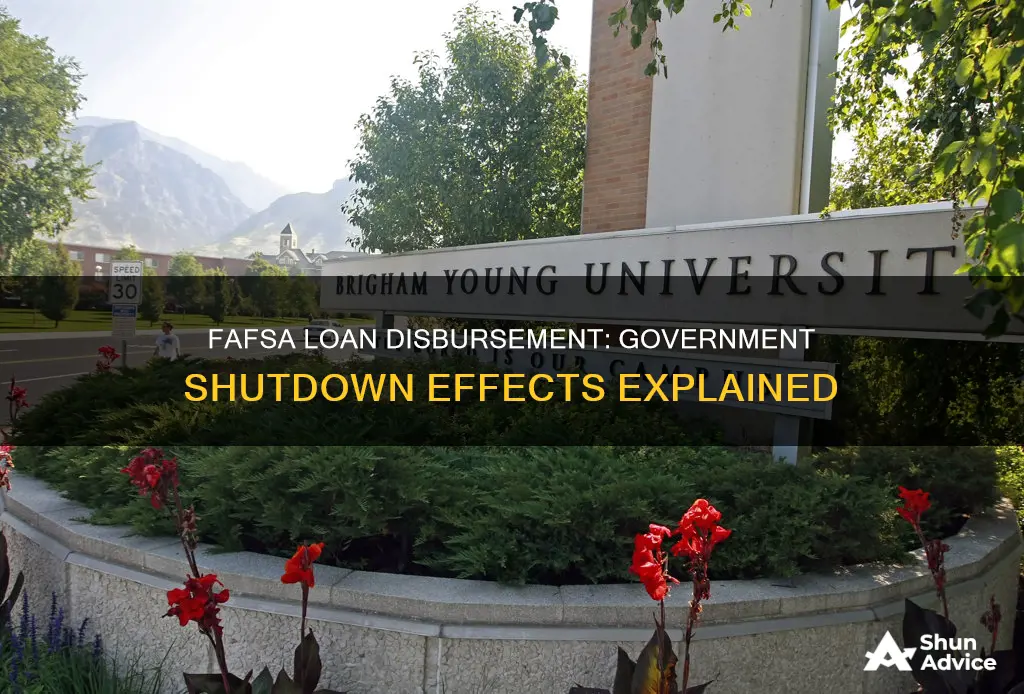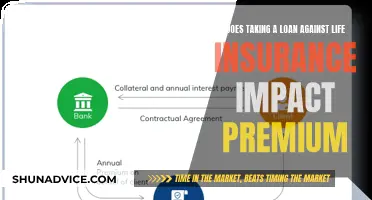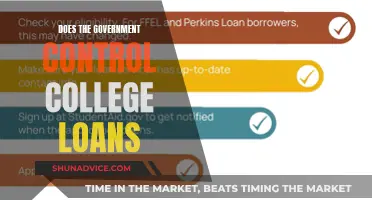
A government shutdown occurs when Congress fails to pass budget legislation for the upcoming fiscal year. During a government shutdown, nonessential government offices are closed, which can impact programs like Social Security and SNAP. Government shutdowns can also affect student financial aid. If you are applying for financial aid for college, a government shutdown could slow down the process. FAFSA applications are still accepted and reviewed during a government shutdown, but there may be delays in processing due to limited staff. Additionally, there could be delays in obtaining tax transcripts and verifying eligible noncitizen status. Students seeking new loans under the FAFSA may experience some delays, especially for certain loan types such as Direct Consolidation Loans. It's important to note that the terms and conditions of federal student loans remain unchanged, and borrowers' rights are guaranteed.
| Characteristics | Values |
|---|---|
| FAFSA Applications | Accepted but may face delays in processing |
| FAFSA Customer Service | Likely to shut down |
| Financial Aid | May be delayed |
| Federal Student Loan Servicers | Continue to answer borrower calls |
| Federal Student Loan Payments | May face significant disruption |
| Student Loan Forgiveness | Applications may be stalled |
| Grants | May be delayed |
| Default Resolution Group | Continue to answer borrower calls |
| Total and Permanent Disability Processing Centers | Continue to answer borrower calls |
| Federal Student Aid Ombudsman | Continue to answer calls |
| Tax Transcripts | May be hard to obtain |
What You'll Learn

FAFSA applications are accepted, but processing may be delayed
While FAFSA applications are still accepted during a government shutdown, processing times may be delayed. This is because, while much of the FAFSA process is automated, staff members are required to resolve any issues that arise. With a reduced number of staff working at the IRS during a government shutdown, there may be a delay in the processing of tax transcripts, which are necessary for filing the FAFSA.
Additionally, the FAFSA customer service center will likely be affected by the shutdown, meaning that families with support needs may not get answers to their queries. This may also be the case for colleges that require support. This could create a backlog of work, which will continue to build the longer the shutdown lasts.
The Department of Education has a detailed government shutdown contingency plan, as this is a situation that has occurred several times in the past. However, with outstanding loan balances hitting $1.6 trillion in the third quarter of 2023, a government shutdown could make matters worse. If lawmakers cannot agree on a solution, the DoE's 2023 contingency plan states that over 89% of its staff would be furloughed during the first week of a shutdown.
It is important to note that the terms and conditions of federal student loans cannot change, even if the agency overseeing them does. Borrowers' rights are guaranteed when they sign the master promissory note when their loans are originated.
Loans: Deferment and Its Impact on Your Finances
You may want to see also

Customer service and support for FAFSA applicants may be unavailable
During a government shutdown, ""nonessential" government offices are closed, which can impact programs like Social Security, SNAP, and more. This includes the customer service and support centers for FAFSA applicants, which may be unavailable during a government shutdown. While FAFSA applications are still accepted and reviewed during a government shutdown, there may be delays in processing times.
The FAFSA customer service center is likely to shut down if the government shuts down, leaving families with support needs without answers to their questions. Colleges that need support with issues will also have to wait, which could create a backlog of work. This backlog might be compounded by layoffs impacting the Department of Education. The longer the government shutdown lasts, the larger the backlog of work will become.
While most of the FAFSA process is automated, staff members are needed to resolve issues. With a reduced number of staff, there may be complications, and applicants may find it difficult to reach someone if they have a question or problem. However, some federal student loan servicers will continue to answer borrower calls, and loan servicers will still be available to help with applications for student loan forgiveness programs.
Additionally, the IRS works with a limited number of employees during a shutdown, which can cause delays in obtaining tax transcripts. Since tax documents are necessary for filing the FAFSA, this can further slow down the application process.
If you are experiencing complications filing the FAFSA, gathering tax documents, or funding your research due to the government shutdown, it is recommended that you speak to the college or university that you attend or plan to attend. Administrators, financial aid officers, and professors will be able to provide guidance and help ensure that the circumstances do not negatively affect your applications, ability to pay for school, and academic pursuits.
Air Force Loan Repayment: What's the Current Status?
You may want to see also

Obtaining tax transcripts may be difficult
While the unavailability of the website will have no impact on aid disbursement or those who filed the FAFSA before the shutdown, it may impact families who waited until the last minute. It is recommended that you apply as soon as the FAFSA application is available and ensure that your tax documents are as up-to-date as possible. That way, you can take advantage of applying early and allow yourself enough time in case you need to complete any other documents or submit additional forms.
If you are experiencing complications filing the FAFSA, gathering tax documents, or funding your research, it is advisable to speak with the college or university that you attend or plan to attend. Administrators, financial aid officers, and professors will be able to guide you through the process during the government shutdown to ensure that your applications, ability to pay for school, and academic pursuits are not negatively affected.
Additionally, there are other sources of assistance during a government shutdown. For instance, Navy Federal Credit Union offers a program to help eligible members address their basic needs. They provide loans that are disbursed only if the government fails to pay eligible members.
CFPB's Regulatory Scope: Private Trust Deed Loans
You may want to see also

Applying for a new loan may be slower
Additionally, if you are a non-citizen, your application could be delayed as verification of eligible non-citizen status may be impacted. Similarly, if you have a drug conviction, there may be a delay in the Department of Justice identifying your application.
If you are applying for a Direct Consolidation Loan outside of the FAFSA, expect some delays. This is because a Direct Consolidation Loan is a separate application that is not processed through a FAFSA application.
Furthermore, if the government shutdown lasts more than a few days, it could also impact FAFSA. While a lot of the FAFSA processing is automated, staff members are needed to resolve issues. The longer the shutdown, the larger the backlog of work.
FDIC-Insured Savings and Loans: Are Your Finances Protected?
You may want to see also

Loan forgiveness applications may be stalled
A government shutdown will not affect your eligibility to qualify for any new federal financial aid. This includes any Federal Pell Grant, FSEOG, or Direct student loans. However, if you are applying for loan forgiveness, your application may be stalled.
During a government shutdown, non-essential government offices are closed, which could impact programs like Social Security and SNAP. While the Department of Education will continue to accept and process FAFSA applications, there may be delays in processing times. This is because, while much of the FAFSA processing is automated, staff members are still required to resolve issues. The FAFSA customer service center will also likely shut down, which means that families with support needs may not get answers to their queries.
The IRS works with a limited number of employees during a shutdown, so if you need a tax transcript, your request might take longer than usual. This could impact your FAFSA application, as you may need a tax transcript to complete it.
The Department of Education has a detailed government shutdown contingency plan. According to the DoE's 2023 contingency plan, the Department would furlough over 89% of its staff for the first week of a shutdown, retaining only the staff needed to perform essential functions. This could result in a significant disruption to services, with borrowers potentially experiencing complications and long wait times.
While loan servicers will still be available to help with applications for student loan forgiveness programs, the reduced staff numbers may cause delays in processing applications for existing loan forgiveness programs.
HELOC Loans in Texas: What's Allowed and What's Not
You may want to see also
Frequently asked questions
FAFSA applications are still accepted and reviewed during a government shutdown. However, there may be delays in processing times, especially if you are a non-citizen or have a drug conviction.
Federal student loan payments and services will continue to be available during a government shutdown. However, there may be limited staff available to answer questions or address issues.
Yes, a government shutdown may delay the processing of your federal student loan forgiveness application.







